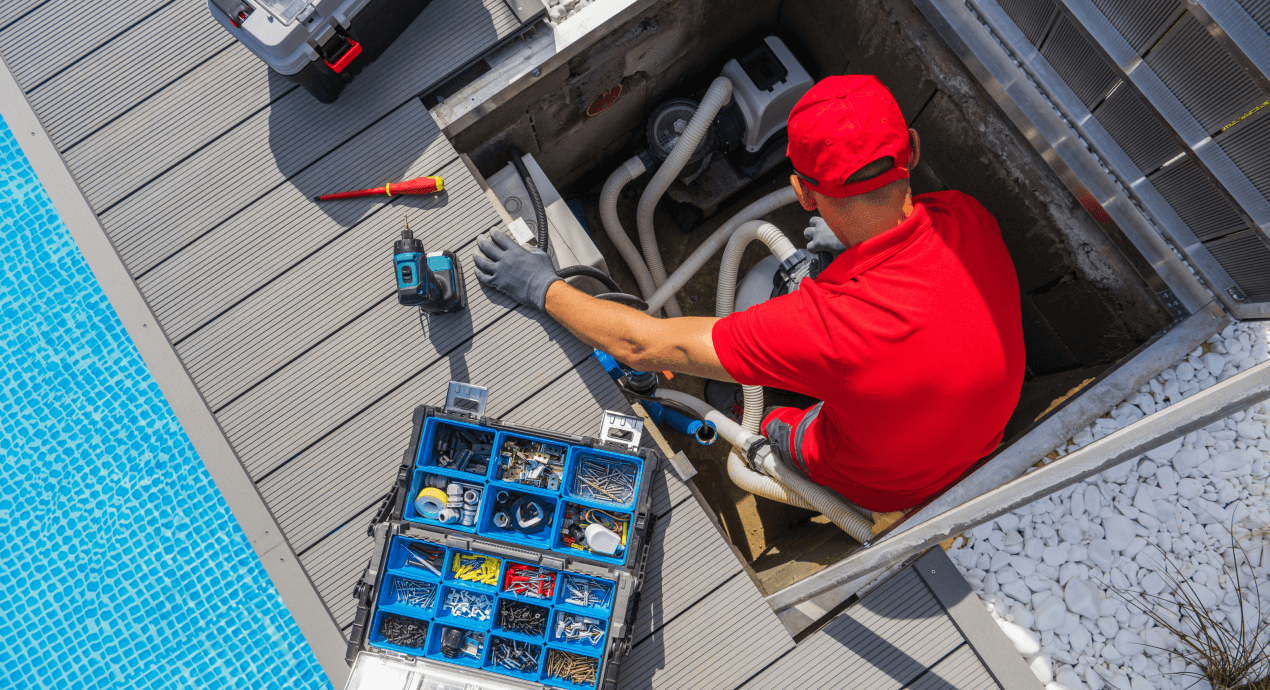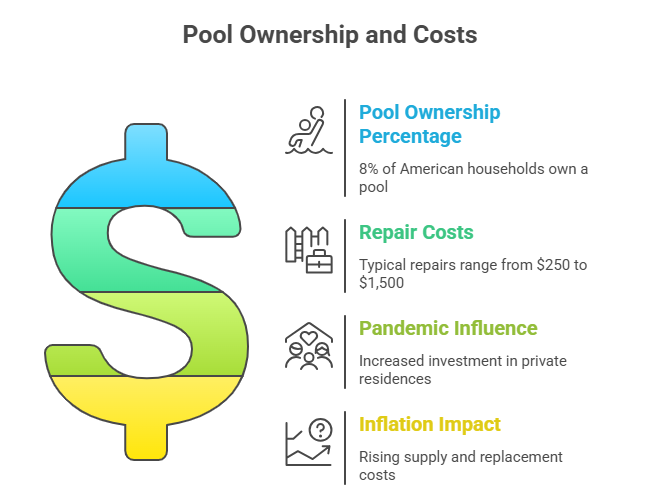
Contemplating coverage?
Subscribe to receive our emails & get
$200 OFF!
Have questions?
Call us: (833) 544-8273


Written By Ally Sabatina
Swimming pool leaks are virtually unavoidable, and most pool owners will encounter them at one point, even with the best maintenance practices. Knowing the signs to look for and the best resources to fix pool leaks can reduce your stress and the likelihood of getting blindsided by a massive repair.
As much as 8% of American households have a private pool and the typical repair costs range between $250 and $1,500, not including routine maintenance expenses. The pandemic prompted families to invest more in their private residences, leading to increased demand for pool construction nationwide, but post-pandemic inflation has contributed to rising supply and replacement costs.
We've compiled some practical tips about common pool leaks and how to fix them, so you can protect your wallet.

There are a few telltale signs you have a pool leak. If you notice any of the following, it's highly likely that a call to a swimming pool repair company is in your future:
If you notice any of these common signs of a pool leak, document the issue by measuring the water level daily, monitoring your water and electric bills, and taking photos of any physical damage. Maintaining detailed documents can help you act quickly and share supporting information with qualified professionals, saving you time and money.
Pool leaks can be grouped into three broad categories: plumbing, structure/shell, and catastrophic water loss. While all of the following types of pool leaks fit into those broad categories, it's important to assess specific components so you can promptly address them.
Vinyl liners can be attractive and cost-effective for homeowners seeking a lower-maintenance, highly customizable swimming pool, but they're not without vulnerabilities. While they are lower maintenance on a daily basis, they need to be fully replaced somewhat regularly to maintain the integrity of your pool in the long run.
The typical pool liner lasts from eight to twenty years, but your weather conditions, pool shape, and liner material can impact this figure, so it's important to regularly inspect the liner for tears or signs of movement.
Your pump is responsible for filtering and balancing the chemicals in your pool. When it stops working properly, chemical imbalances and debris can exacerbate underlying issues, leading to an unexpected pool leak. Pay attention to your electric bill and other signs that your pool pump is operating suboptimally, such as clutter in the corners or standing water near the equipment.
Neglected filters can burden your pump and other pool components. While your filter is a part of your pump system, it is a distinctly separate accessory. Poorly maintained, improperly sized, or unreputable brand filters can lead to unwanted debris, algae overgrowth, and stagnant water that can degrade your pool's structure and utility systems, leading to leaks.
Inspect your filter annually and consider changing it once every five years or when you notice changes in water clarity and pressure gauge readings.
The skimmer may not be the first place you check for a leak, but it can be helpful to rule it out. Skimmers and filters work together to keep your pool clean and clear, but they are separate devices that fulfill different functions. The skimmer's job is to catch large debris before it can clog your filter. In some cases, the skimmer can be overburdened with larger debris or you may notice cracks in the plaster pool siding near the skimmer. Debris can damage the hydrostatic and multiport valves, leading to water loss.
Skimmer repairs can be more minimal than other pool leak causes, so acting quickly can prevent future issues and more costly repairs.
Underground plumbing and other structural issues with your pool can go undetected for longer periods because the signs aren't apparent until the issue has progressed. Concrete movement, rust, tree root growth, and other invisible actors can stress your pool walls and plumbing, creating an opportunity for cracks to form along the weakest points.
At first, water may seep slowly and go unnoticed, but as the issue develops, you'll notice soil erosion, higher water bills, and eventually pooling water near the site where the water drains.
No one wants to spend money on a costly swimming pool repair, but putting it off can lead to more expensive issues, especially if water compromises your pool's structure or your home's foundation. At face value, the biggest risk of ignoring a leak is interrupted swimming time. You're paying the costs of operating the pool, so not using it can be more than an inconvenience.
Beyond that, ignoring a leak can strain your pool equipment and unbalanced chemicals, contributing to a less-than-satisfactory swimming experience and more frequent part repairs and replacements. Uneven water pressure can damage your pool's shell, especially if you have a vinyl liner.
Ongoing leaks can erode your surrounding landscape, kill grass, attract mosquitos, and other issues that make it difficult to enjoy your outdoor spaces. Particularly disastrous leaks can also spread outside your property lines, creating additional expenses and tensions in your neighborhood.
Swimming pool leak repairs come in all shapes and sizes, so it's important to accurately diagnose the issue and act quickly to prevent secondary damage.
Many simple pool repairs can be DIYed if you have the proper tools and supplies. If you notice small cracks around your pool lights and other built-in accessories, you can use pool putty, waterproof silicone, vinyl and plaster patches to reinforce the seal. You can also replace small parts, like skimmer gaskets or filter valves, by looking up the part number online and installing it yourself.
More complex pool repairs require trained professionals. If you're unable to successfully diagnose, access, or repair the source of your pool leak on your own, you'll need to hire a repair technician. You may need to bring in a professional pool repair company if you have extensive tile damage, underground pipe leaks, or irreparable degradation of your pool liner.
Many complex repairs require you to partially or fully drain your pool, which can present logistical challenges if you live in a densely populated area.
Liberty Home Guard (LHG) is one of a few home warranty providers that offers pool repair coverage. As a LHG-subscriber, you can elect additional coverage for a standalone pool or spa, pool-spa combo, or saltwater pool. For combination pool-spa coverage to apply, the two systems must share the same components and parts, otherwise you'll need to purchase an add-on for each.
LHG's sample contract explicitly explains the covered items and components of your pool and spa. We've broken it down below.
LHG's home warranty policy and pool/spa add-ons will cover the following when they break due to normal wear and tear:
It will not cover the following:
Home warranties provide peace of mind when your most used systems and appliances break down due to regular use, but they're not a band-aid for all situations. For example, you may not be able to file a claim for accidental damage or vandalism, but you can file a claim if you notice the pump malfunctioning one day. In the latter scenario, home warranties can reduce the burden on your resources by saving you time locating and scheduling a qualified technician––LHG vets them for you!––and defray many costs by spreading payments into monthly installments.
Liberty Home Guard's plans offer unmatched flexibility for homeowners because its add-ons can modify any plan tier, so if you're mostly focused on your home's built-in systems, you can choose the systems-exclusive Systems Guard and still enjoy pool protection with the relevant add-on.
It's best to act quickly on pool repairs to reduce the threat of secondary damage and more costly issues. Home warranties, like ours, can provide peace of mind for cost-conscious and busy homeowners who don't have the resources to hire and pay for repairs out of their own pockets. They can be particularly advantageous for homeowners who weren't the original builders of their pool and thus don't have access to maintenance records or existing warranties.
While home warranties won't pay for all pool repairs, they can supplement homeowners insurance well. Homeowners' insurance will often pay for structural damage and issues caused by an Act of God, but it won't cover everyday issues. Home warranties can fill in these gaps, reducing the economic pressure as long as you maintain your pool and clearly understand the terms of your coverage.
Request a quote today to learn more about our coverage and how it can work for you.
There's a reason Liberty Home Guard was rated the #1 Home Warranty Service by U.S. News and World Report for 2021, 2022, 2023, and 2024. Check out our services.The Best Home Warranty Service
The most likely places for a pool leak are the liner, pump, filter, plumbing, and skimmer. You may not notice the source of a pool leak at first glance, so it’s often necessary to hire a pool leak detection company to assess and diagnose the issue.
The most common pool leaks often depend on your geography, condition, and type of your pool. For example, in-ground pools may be more likely to leak through cracked pipes in the underground plumbing, while above-ground pools may deal with more liner leaks.
If you notice your pool is leaking, check the terms of your home warranty agreement if you have one. In some cases, home warranty companies can defray the cost of pool repairs if you have sufficient coverage. Contacting your home warranty company first will ensure you comply with its claims process and can take full advantage of your coverage. If you don’t have a home warranty, your first step will be finding and vetting local pool leak detection and repair companies.
You can usually distinguish leaks by observing where the water collects. Plumbing leaks often cause wet spots, soft soil, or higher water bills, while structural leaks may show cracks in the liner, tiles, or pool shell. A bucket test can also help confirm whether the water loss is due to evaporation or an actual leak.
Yes, small leaks can often be patched temporarily with pool putty, vinyl patch kits, or waterproof sealants. These solutions work best for minor cracks around lights, tiles, or fittings. However, temporary fixes should not replace professional repairs, especially if the leak is underground or causing significant water loss.
Stay Ahead of Potential
Home Mishaps!
Subscribe to our Liberty Home Guard Newsletter and gain access to exclusive content that ensures your peace of mind.